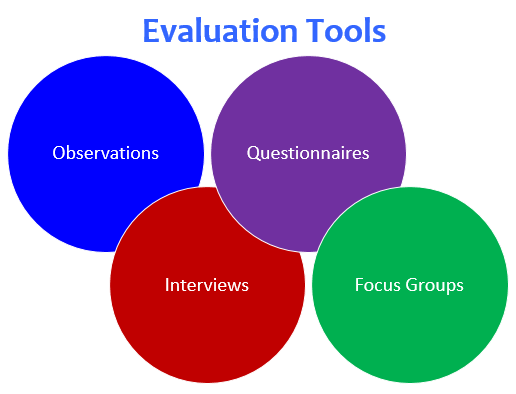Training Evaluation Tools
Training evaluations are conducted with the intent of obtaining information on the effectiveness of the training program. Training evaluations are intended to check whether the training event has met its objectives and whether participants are able to implement his or her learning on the job. The results of the evaluation process help training professionals modify future training strategies to meet objectives and implement learning to positively affect job performance.
Training Evaluation Tools
Training evaluation tools are what is used to collect data on the training programs. They come in a variety of forms and can be divided into categories such as questionnaires, interviews, focus groups, and observations. These methods are often used collectively to achieve a variety of results from different perspectives. Ultimately, several are combined to obtain the best overall assessment of the program.
These methods are designed to determine a learner’s perceptions, experience, and behavior using both qualitative and quantitative data. The information obtained can be used to modify future training sessions.
Training Evaluation Tools
Questionnaires
Interviews
Focus groups
Observations
Questionnaire
Questionnaires are the most common of the training evaluation tools used to gather information on a program or session. This is because they are an efficient way to gather large amounts of both quantitative and qualitative data about a training course.
Questionnaires are a set of questions delivered to individuals for obtaining useful statistical information on a particular topic. It is an excellent tool for a reaction level assessment from the participants immediately following the training course.
A questionnaire can;
- Be brief or extensive (typically, the shorter the better)
- Be paper, email, or online
- Have closed questions, open-ended questions, scaled questions, or multiple choice questions
- Be completed immediately after the training or later (days or weeks)
Benefits of a Questionnaire
- Gathers a large amount of data, providing a broad perspective
- Minimal time to administer
- Little cost to administer
- Can easily encompass a large number of participants
- Can provide a wide scope of information about leaner’s opinions and behaviors
- Has consistency since every individual is asked the same questions in the same way
Disadvantages of a Questionnaire
- Can have a low response rate
- Can receive confusing or vague responses
- Questions may be difficult to understand so respondent may not answer it
- Difficult to get clarification to responses and investigate issues further
- They do not allow for any observation
- Different people understand questions differently
Focus Groups
A focus group is a facilitated discussion with a group of individuals who share similar characteristics or common interests intended to collect information or obtain opinions on a specific issue. Focus groups are an excellent method to get more in-depth information on perceptions, insights, attitudes, or experiences.
Focus groups are used to understand participant’s perspective of the training course including instructor engagement, course materials, and application to work duties. The goal of this method is to obtain qualitative data, meaning that the data is descriptive and not necessarily measured numerically.
Ideally, the group discussion is facilitated in a non-threatening environment so participants feel they can speak more freely. Also, a semi-structured approach using open-ended questions to generate discussion is most useful.
Benefits of a Focus Group
- Useful for gathering subjective perspectives
- Able to receive information from many people at the same time
- Able to learn about participants experience and perspective through group dialogue
- Able to ask follow up questions to dive deeper into potential issues
- Able to further explore a topics, providing a broader understanding of why the participants think or feel a particular way
Disadvantages of a Focus Group
- Can be time-consuming to administer
- Sessions need a moderator to facilitate
- Sessions need an assistant to take detailed notes
- Sessions need approximately six to twelve people who share similar characteristics or common interests
- Group dynamics can play key role in determining the effectiveness
- Sessions need to ensure a comfortable environment so participants feel they can speak freely
Observation
Observation is a method of gathering data by watching an individual’s behavior in their natural setting. It entails simple watching and noting a person’s behavior after a training course to determine if they are able to perform the intended objectives. This method allows many aspects to be captured, including the physical environment, the person’s own behaviors, and his or her interactions with others.
Observation is a fairly inexpensive method for discovering more about learners’ behaviors, but it does have its limitations.
Benefits of an Observation
- Inexpensive method because it only requires an observers time
- Easy to complete
- Gathers information on actual behaviors rather than reported behaviors
- Allows observer to directly see what people do rather than relying on what people say they do
- Non-verbal language can provide valuable information
- Able to collect information as the learning is being applied
- Does not rely on people’s willingness or ability to provide information
Disadvantages of an Observation
- Can be time-consuming since it typically only assesses one person at a time
- Validity and reliability of the data may be affected since people usually perform better when they know they are being observed
- Difficult to assess preferences, opinions, or thought process
- Is open to misinterpretation
- Does not increase understanding of why a person behaves as they do
- Can be considered intrusive
- Susceptible to observer’s bias
Interviews
Interviews are a data collection method aimed at gathering both facts and opinions. They involve asking open-ended questions where the respondent can answer the questions in as much detail as her or she wishes to. Interviews can provide valuable insight into the behaviors, attitudes, opinions and mindsets.
There are different ways to conduct interviews including face-to-face, by telephone, or through Chat on the computer.
Benefits of Interviews
- Flexible
- Can provide valuable insight into individual perspectives
- Can ask follow questions to clarification
- Can delve deeper into potential issues
- Can be recorded to provide information for closer review at a later time (i.e. assess body language)
Disadvantages of Interviews
- Can be time-consuming to administer
- Not the most cost effective since you typically only interview one person at a time
- No direct evidence a person can perform specific behaviors



